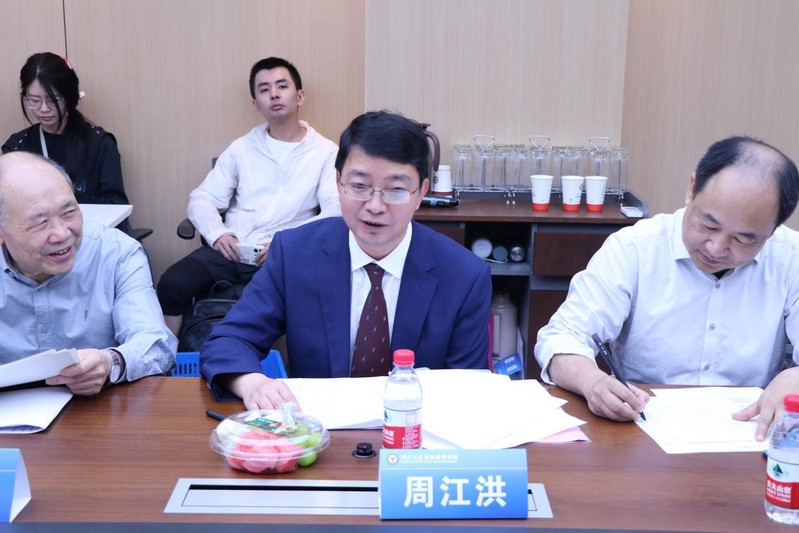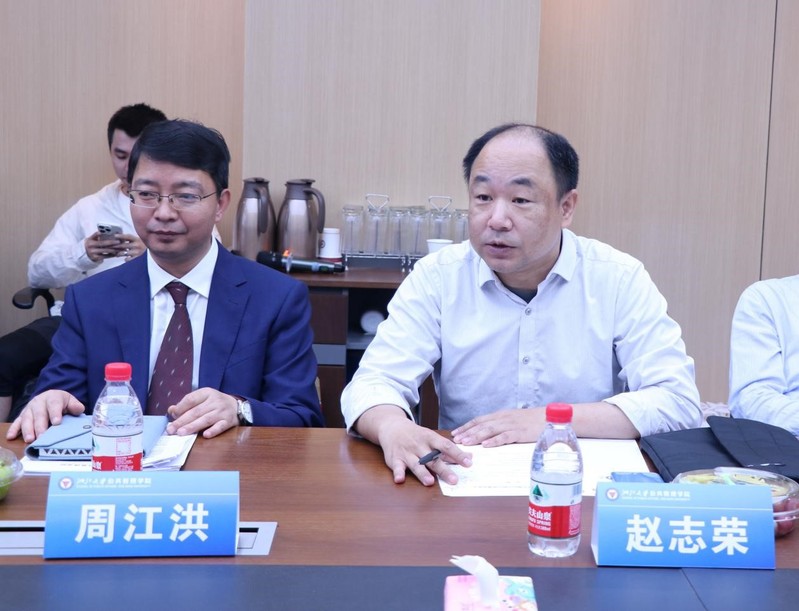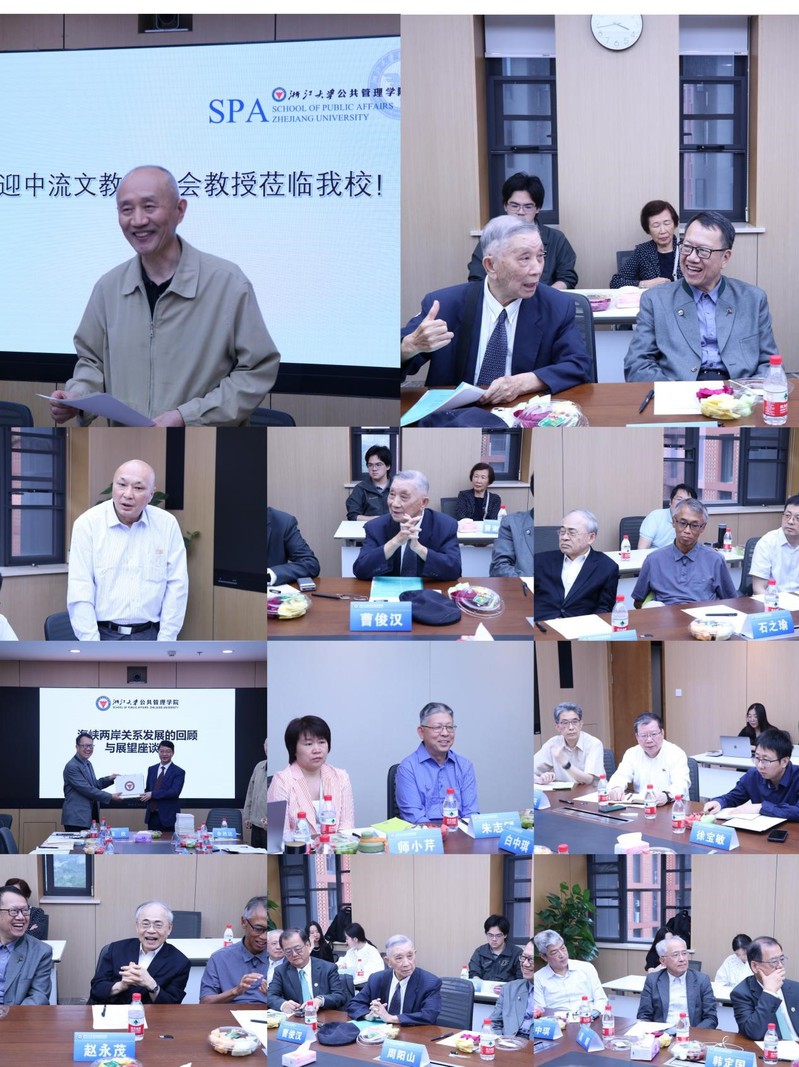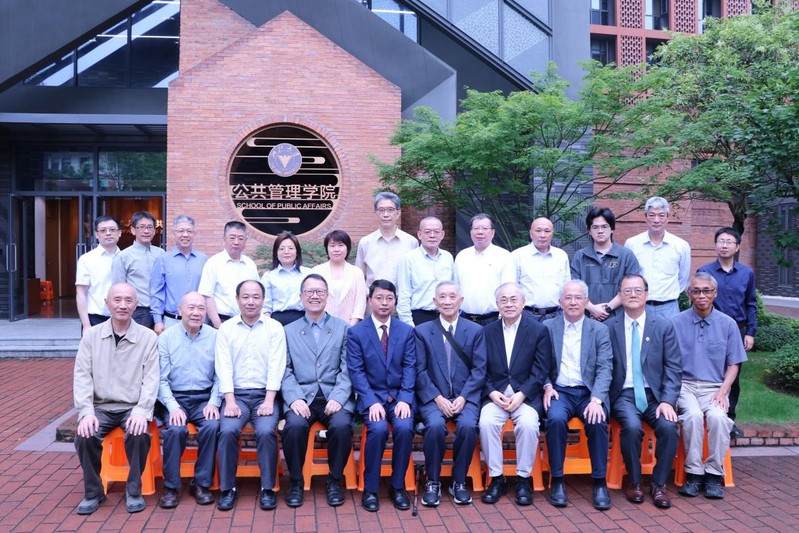On the afternoon of June 6, 2024, the "A Review and Prospect of Cross-Straits Development " symposium, hosted by the School of Public Affairs at Zhejiang University, was successfully held in the Conference Room901of the School of Public Affairs of Zhejiang University. The attendeeslist of this symposium featured Prof. Zhou Yangshan, Chairman of the Board of Directors of Taiwan, China Zhongliu Culture and Education Foundation, Prof. Zhao Yongmao, Honorary Professor of the Department of Political Science of National Taiwan University, Mr. Cao Junhan, former Professor of National Taiwan University and Dean of the College of Social Science of Chinese Culture University, Prof. Shi Chi-Yu, Professor of the Department of Political Science of National Taiwan University, Mr. Han Tingguo, Chairman of Symbiosis Consumer Group, Mr. Bai Chung-qi, Convenor of the Mainland Public Affairs Group of SinoPac Holdings, and Prof. Gao Lang, Head of the Department of Social Science of Hang Seng University of Hong Kong, along with other directors of the Taiwan, China Zhongliu Culture and Education Foundation, as well as Mr. Ren Mian, Deputy Director of the Research Center for Cross-Straits Relations of the Taiwan Affairs Office of China, Qiu Tao, Deputy Director of the Office of the Research Center for Cross-Straits Relations, and Chen Xin, Third Grade Consultant of the Research Department of the Taiwan Affairs Office of Zhejiang Province. Participants from Zhejiang University included Prof. Zhou Jianghong, Vice President of Zhejiang University, Prof. Yao Xiangguo, Senior Professor of Liberal Arts, former Director of the Association for Relations Across the Taiwan Straits and Deputy Director of the Academic Committee of Zhejiang University, Prof. Zhao Zhirong, Dean of the School of Public Affairs of Zhejiang University, Prof. Xu Baomin, Vice Dean of the Institute of Social Sciences and Director of the Office of the Leading Group of the Think Tank Work of Zhejiang University, Prof. Wang Shizong, Head of the Department of Governmental Management of the School of Public Affairs, Prof. Lang Youxing, Head of the Department of Political Science of the School of Public Affairs; Prof. Liu Guozhu, Director of the Center for American Studies of the School of History; Prof. Wang Zhengxu,Qiushi Chair Professor of the Department of Political Science of the School of Public Affairs; Shi Xiaoqin, Research Fellow of the Department of Political Science; Geng Shu, Tenure Associate Professor of the Department of Political Science; Kong Xiaohui, Associate Professor of the Department of Political Science; and Zhu Zhiqun, Professor of International Relations and Politics, Bucknell University, United States of America. The symposium was hosted by Prof. Yu Xunda, Director of the Institute of Political Science of the School of Public Affairs.

On behalf of Zhejiang University, Professor Zhou Jianghong, Vice President of the university, warmly welcomed the delegation of the Taiwan, China Zhongliu Culture and Education Foundation. He recalled the long-established historical bond between Zhejiang University and its Taiwan universities. Mr. Zhang Qiyun, Dean of the Department of History and Geography of Zhejiang University, founded the Chinese Culture University in Taiwan in cooperation with the alumni of Zhejiang University, continuing to pass on the Chinese culture and upholding the spirit of faith of truth in Zhejiang University. Academic communications and exchange programs between Zhejiang University and Taiwan universities are frequent and rich. Zhejiang University has signed inter-university academic cooperation and exchange agreements with many Taiwan universities, including National Taiwan University, NationalChengchi University, Chinese Culture University, National Cheng Kung University and Chung Hsing University. The Zhejiang University Guanghua Law School is the representative of cross-Straits academic communications with very close academic exchanges. Academic exchanges between Zhejiang University and Taiwan have been benefited from the peaceful development of cross-Straits relations and will certainly contribute to the integration and development across the Taiwan Strait.

Prof. Zhao Zhirong, Dean of the School of Public Affairs, delivered a speech, in which he warmly welcomed the arrival of the Taiwanese scholars, and the development of cross-Straits relations has profound significance for both mainland China and the world. Dean Zhao Zhirong introduced the construction and development of the School of Public Affairs in terms of its history, discipline construction, faculty, talent training and scientific research. He reviewed the academic exchanges between the School of Public Affairs and Taiwan universities, and expressed his expectation for further academic exchanges and cooperation between Zhejiang University and Taiwan universities in the future. Mr. Chou Yang-shan, Chairman of the Board of Directors of Taiwan, China Zhongliu Culture and Education Foundation, said in his speech that promoting cross-Straits academic exchanges is the core value of the foundation. The Taiwan, China Zhongliu Culture and Education Foundation will emphasize the inheritance of Chinese culture and adheres to the humanistic spirit. The Taiwan, China Zhongliu Culture and Education Foundation has maintained academic exchanges with mainland universities, including Peking University, Fudan University, Nanjing University and Zhejiang University. Since the 1990s, the Foundation has played an important role in cross-Straits exchanges.

In the ensuing scholars' seminar session, discussions were held on the review and prospect of the development of cross-Straits relations. First of all, scholars across the Taiwan Strait expressed their common desire to promote the development of cross-Straits relations and realize the China’s complete reunification. Both sides should strengthen cooperation and communications, create mutual benefits and win-win situations, and work together for the rejuvenation of the Chinese nation. Secondly, scholars analyzed the current challenges and opportunities for the development of cross-Straits relations. The scholars discussed the problems in the development of cross-Straits relations in terms of the historical evolution of the development of cross-Straits relations, Taiwan's electoral system, Taiwan's educational issues of history and the DPP's political mobilization in the island. Moreover, scholars point out that there exist opportunities for the development of cross-Straits relations. With the mainland's growing economic power, the Taiwanese public support for the DPP is expected to decline.The increasing economic strength of the mainland poses a significant deterrent to the pan-green forces on the island. Cross-Straits exchanges are very significant to the development of cross-Straits relations, and the more cross-Straits exchanges the Taiwan public participates in, the less likely they are to reject cross-Straits unification. Although ordinary Taiwanese people have doubts about cross-Straits unification, young people are getting closer, who are the generation after 00s and 10s across the Taiwan Strait, and it is not easy for them to form a sense of difference between each other. Other scholars have suggested that infrastructure construction on the mainland could be a key element of cross-Straits cooperation. The mainland has not only the need to build new infrastructure, but also the advantage of building new infrastructure. The mainland has a world-leading basis of network infrastructure, together with solid infrastructural construction of the Internet, Internet of Things, and big data. The mainland's new infrastructure will provide huge and new opportunities for cross-Straits industries to deepen cooperation, and Taiwan's industries also have the natural advantages to participate in the new infrastructure. Finally, scholars across the Taiwan Strait put forward a number of suggestions for the development of cross-Straits relations. Some scholars suggested that it is crucial to think differently in cross-Straits exchanges. It is important to look at the differences between the two sides of the Taiwan Strait with a tolerant and open attitude, and to be tolerant of each other. All the scholars agreed that both sides of the Taiwan Strait should increase exchanges, and strengthen the fusion of emotion and increase common interests by constant exchanges and cooperation. It is essential to release goodwill to each other, enhancing mutual understanding and tolerance.

The Taiwan, China Zhongliu Culture and Education Foundation was established on the initiative of Mr. Hu Fo, a political scientist and academician of Academia Sinica in Tainwan, and the board members of foundation are all prominent scholars from Taiwan. The foundation upholds the 'One China' principle, and has long been committed to cross-Straits academic exchanges, promoting the peaceful development of cross-Straits relations, as well as supporting cross-Straits peaceful reunification, which is well-known in academia between both sides of the Taiwan Strait.


